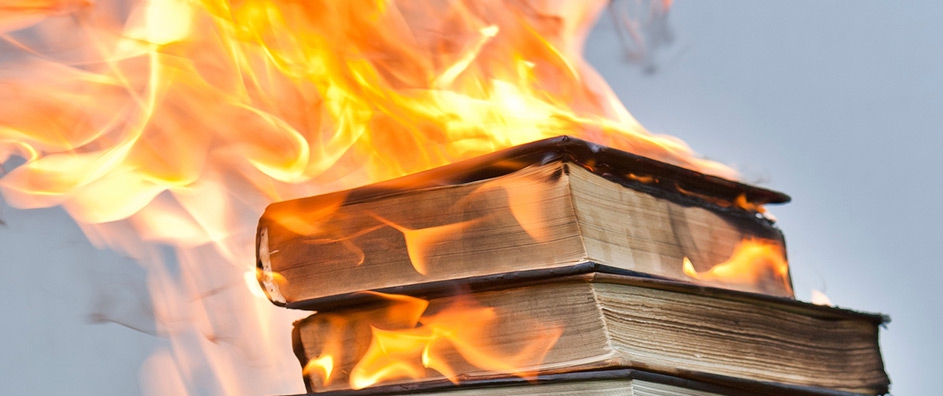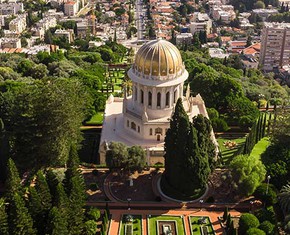The views expressed in our content reflect individual perspectives and do not represent the authoritative views of the Baha'i Faith.
As a token of grace from God, the Revealer of this Most Great Announcement, We have removed from the Holy Scriptures and Tablets the law prescribing the destruction of books. – Baha’u’llah, Tablets of Baha’u’llah, p. 25.
A few months ago ISIS troops ransacked and burned Mosul’s central library, destroying an estimated 100,000 books, including a rare collection of Ottoman-era manuscripts. They then went on to destroy the libraries of multiple universities in the Northern Iraqi city.
Irina Bokova, the Director-General of the UN’s Educational, Scientific and Cultural Organization (UNESCO) responded by calling it “one of the most devastating acts of destruction of library collections in human history. This destruction,” she said, “marks a new phase in the cultural cleansing perpetrated in regions controlled by armed extremists in Iraq. It adds to the systematic destruction of heritage and the persecution of minorities that seeks to wipe out the cultural diversity that is the soul of the Iraqi people.”
In their fanatical interpretation of Islam, ISIS believes that burning books will somehow remove “un-Islamic” thoughts from society. This kind of censorship-by-fire and “cultural cleansing” has a long history, not just among Muslims but in Christian, Jewish, Hindu and some Chinese cultures. Book-burning was used by the Roman legions when they burned the Library of Alexandria; by the Christian emperor Constantine in his suppression of nontrinitarian beliefs; by the Spanish Conquistadors in the Mayan and Aztec Yucatan; and by the Nazis before and during World War II. In the War of 1812, English troops piled all 3,000 books from the Library of Congress against the stone walls of the US Capitol to burn it down, meaning to humiliate and degrade the rebellious Americans. Book-burning also often accompanies genocide—stemming from cultural, religious, or political opposition to an entire ethnicity, race or civilization—and attempts to wipe out the cultural memory and heritage of a people.
Much ancient religious thought condoned book-burning—but the Baha’i teachings outlaw it completely:
In former religions such ordinances as holy war, destruction of books, the ban on association and companionship with other peoples or on reading certain books had been laid down and affirmed according to the exigencies of the time; however, in this mighty Revelation, in this momentous Announcement, the manifold bestowals and favours of God have overshadowed all men, and from the horizon of the Will of the Ever-Abiding Lord, His infallible decree hath prescribed that which We have set forth above. – Ibid., p. 28.
The unbelievers and the faithless have set their minds on four things: first, the shedding of blood; second, the burning of books; third, the shunning of the followers of other religions; fourth, the extermination of other communities and groups. Now however, through the strengthening grace and potency of the Word of God these four barriers have been demolished, these clear injunctions have been obliterated from the Tablet and brutal dispositions have been transmuted into spiritual attributes. – Baha’u’llah, Tablets of Baha’u’llah, p. 91.
Why does book-burning continue? The Baha’i teachings say it stems from superstition and ignorance:
True religion is the source of love and agreement amongst men, the cause of the development of praiseworthy qualities; but the people are holding to the counterfeit and imitation, negligent of the reality which unifies; so they are bereft and deprived of the radiance of religion. They follow superstitions inherited from their fathers and ancestors. To such an extent has this prevailed that they have taken away the heavenly light of divine truth and sit in the darkness of imitations and imaginations. That which was meant to be conducive to life has become the cause of death; that which should have been an evidence of knowledge is now a proof of ignorance; that which was a factor in the sublimity of human nature has proved to be its degradation. Therefore the realm of the religionist has gradually narrowed and darkened and the sphere of the materialist has widened and advanced; for the religionist has held to imitation and counterfeit, neglecting and discarding holiness and the sacred reality of religion. – Abdu’l-Baha, Foundations of World Unity, p. 71.
For Baha’is, no legitimate religion is foreign or objectionable, because the Baha’i teachings say that “true religion is the source of love and agreement…” In fact, Baha’is believe that the destruction of books, especially the sacred scriptures of any belief system, destroys the very foundations of human civilization:
By the Lord God, and there is no God but He, even the minutest details of civilized life derive from the grace of the Prophets of God. What thing of value to mankind has ever come into being which was not first set forth either directly or by implication in the Holy Scriptures? – Abdu’l-Baha, The Secret of Divine Civilization, p. 96.
All the sacred Books were written to lead and direct man into the ways of love and unity… – Abdu’l-Baha, Paris Talks, p. 107.
From a Baha’i perspective, destroying books would be like destroying a part of ourselves. Since all religion comes from the same source, and since all sacred scriptures are chapters in the same book, and since humanity’s ultimate progress comes from one God, Baha’is strive to unite a fractious world and peacefully stop the wanton destruction of books, peoples and cultures.
Next: What Baha’i Books Should I Read?
You May Also Like
Comments

















Books are life, from "the movie "The Secret Life of Walter Mitty" to the Scriptures, to Pulitzer prize winners, to diaries and journals. Everyone has a story worth telling, the Writer's Creed.
Reminds me of my son Jesse and wife Rachel, when they moved from 24th St to 14th in the City. They packed 3 large boxes of clothes ...and 93 smaller boxes of...books.